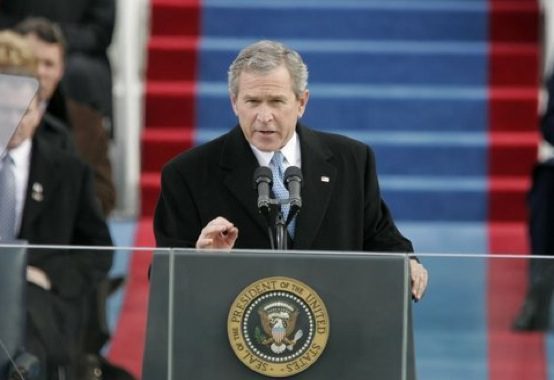When Democratists Blame America

Elliott Abrams makes an extremely simplistic link between U.S. foreign policy and the newest Freedom House rankings:
What is the relationship between these unhappy trends and American foreign policy? Complex question, to be sure, but the regression in freedom and the decline in perceived American power overlap. Moreover, the decline in freedom and the decline in perceived U.S. government interest in advancing freedom also overlap. Hard to believe all this is coincidence.
Having admitted that the question is complex, Abrams then gives the most predictable and convenient answer possible. One would be hard-pressed to prove that there is any meaningful link between “the decline in freedom and the decline in perceived U.S. government interest in advancing freedom.” For one thing, local conditions in dozens of countries are bound to matter far more than anything the U.S. does or doesn’t do. For another, the decline that Freedom House has been measuring dates back to the start of Bush’s second term, which is when Abrams would have us believe that the U.S. was actively interested in “advancing freedom.” That was the period following Bush’s Second Inaugural when his supporters made a lot of noise about the so-called “freedom agenda” and when they claimed credit for various “color” revolutions around the world.
However, the “freedom agenda” had precious little to do with the advance of anyone’s freedom. The governments that came to power through “color” revolutions usually proved to be just as authoritarian and abusive as the ones they replaced, if not more so. In practice, the “freedom agenda” empowered nationalist and sectarian leaders that said the things Washington wanted to hear, and in return Washington praised them for their supposed devotion to democratic principles. The demise of the “freedom agenda” had no more to do with the decline in freedom in many places around the world than the “freedom agenda” had to do with any gains that happened to take place. It is a typically American conceit that the political developments of the rest of the planet depend heavily on what the U.S. is or isn’t doing, but in this case as in many others it simply isn’t true. That doesn’t tell us whether the U.S. should back democracy promotion efforts or not, but it should remind us that the U.S. normally doesn’t and can’t have that much influence in “shaping” other nations’ politics.
Obama has indeed emphasized democracy promotion less than his predecessor, but that is almost beside the point. According to Freedom House’s findings, freedom has been retreating around the world every year for the last decade no matter how much support the U.S. gives to democracy promotion efforts. Some of this has happened because established authoritarian regimes have clamped down and imposed additional restrictions, and some of it has happened because existing democratic governments have been toppled by coups or have given way to one-party rule or middle-class backlashes in favor of more restricted regimes. In other cases, freedom has declined because some countries have become more democratic, and therefore more majoritarian and illiberal. There have also obviously been severe economic upheavals that have affected countries all over the world in the last seven years. Those are the factors that help to explain these developments. Trying to find some way to pin this on U.S. “inaction” or lack of interest in democracy promotion is ridiculous.
Comments